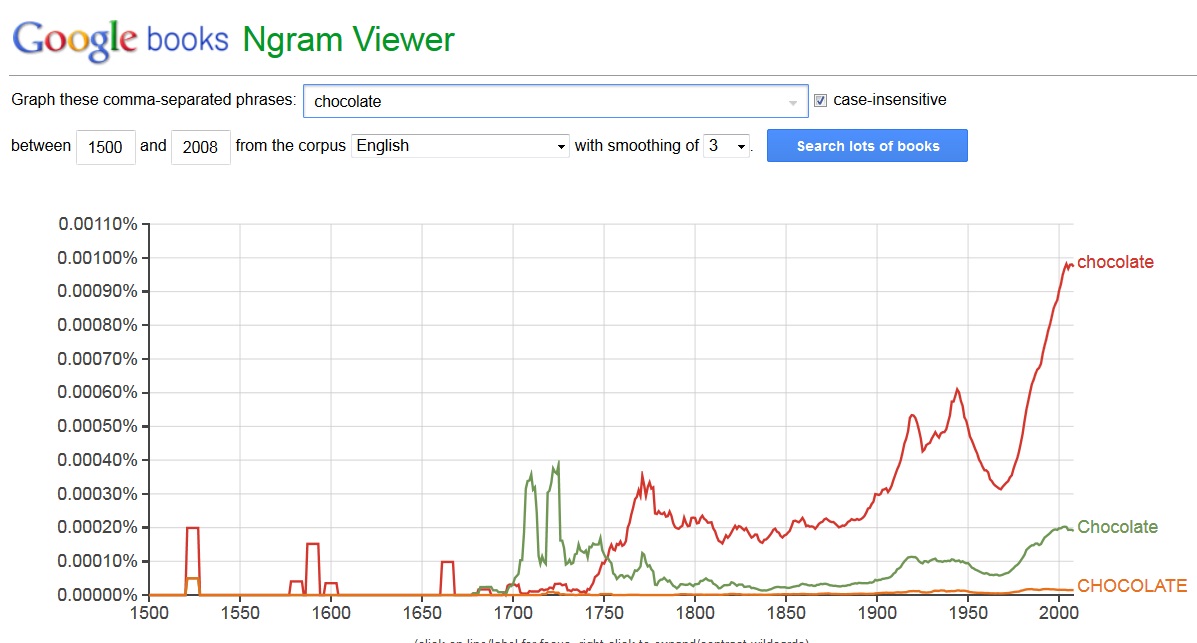Your cart is currently empty!

Google’s Ngram Viewer and Keywords
As Google’s research brings its search engine closer to a humanlike command of language, focusing on keywords becomes less important. Since Google Analytics no longer provides as much keyword data, the value of keywords becomes less measurable, too.
Until Google Search reaches its planned pinnacle of human language skill, however, we still have to do our best to use the terms people search for. One of our main go-to tools is Google Trends, where you can see how frequently people search for terms with Google. You can see the current breakout terms, which can be very useful for bloggers. Say you’re writing for a company that makes skin care products — it’s time to get those Movember posts out!
When we think about evergreen content, though — the lasting content which will bring people to our website for years — we need a longer view.
Trends will show you changes back to 2007. So, still thinking about our skin care company, we can see that popular terms for creams for facial skin have changed over the past few years:
BB Balm is the current winner, with moisturizer and face cream fairly close seconds, and cold cream toward the bottom of the chart. Does this mean we should go with “BB balm” for all our discussions, or should we hedge our bets with “moisturizer” and “face cream,” both of which are still showing upward trends?
Or is the fast rise of BB balm and the beginning of a fall telling us that this terms is a brief fad, best treated like “Movember,” and that we should stick to “moisturizer”?
Google has another tool, less well known, which I learned about in a forthcoming book, Uncharted: Big Data as a Lens on Human Culture by Erez Aiden and Jean-Baptiste Michel. These two intrepid statisticians figured out a way to sample Google Books to see how words have been used in books over the past few centuries — from 1500 to 2008, which means that their tool overlaps just slightly with Google Trends. This tool, the Ngram Viewer, has been available since 2010
The Ngram Viewer gives us much more scope. Granted, the terms people used for skin care products in 1760 won’t be useful for our marketing in 2013. However, look at the pattern we see for the same terms:
BB balm didn’t really exist in 2008, or at least wasn’t well enough known to be mentioned in books. Cold cream, which had a rise like that of BB balm though not as fast, has effectively been replaced by “moisturizer,” another climber. It had a long run, but it is probably on its way down and out.
“Face cream,” on the other hand, had no meteoric rise and fall and no real peak. While we do see a bump in the 40s alongside cold cream, it has been used fairly steadily for a hundred years, and is still gradually rising.
We can’t tell whether BB balm will last or not from the data in these two charts, but we can tell a couple of things:
- Both “moisturizer” and “face cream” are probably still viable terms going forward.
- Terms in this area don’t change very fast. We tried a dozen more terms culled from old ads, and found that even the most obscure had been used for decades. Even if BB balm and moisturizer both mirror the path of cold cream, they’ve got a couple more years at least before they become obsolete.
Searches for the names of toys give completely different patterns; apart from classic toys like dolls and blocks, the names of toys have short life spans. If we’re writing for a toy company, we should talk about our current products and allocate resources for frequent updates — and do our best to get the company to make a doll or some blocks, too. Aiden and Michel have found that new things are being adopted more quickly and abandoned more quickly as time goes on, so the quick rise and fall of toys in past decades suggests that we shouldn’t expect longevity in new toys in the future.
The Ngram Viewer can be set to look at only a few years at a time and to check in other languages, too. We can distinguish between American and British English and, thanks to a new update, use wildcards and specify whether to focus on nouns or verbs. See some nice examples of recreational use at Information is Beautiful.
The Ngram Viewer will doubtless continue to be more interesting to linguists and historians than to the average website owner, but it’s nice to know we have a source of data when we need a longer view.
by
Tags:



Leave a Reply